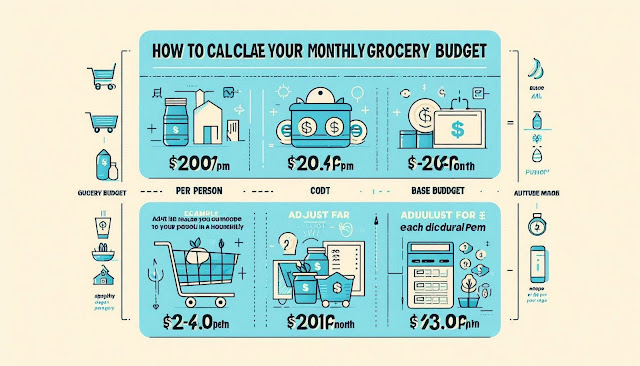How to Calculate Your Monthly Grocery Budget Based on Household Size
Setting a realistic grocery budget is crucial for effective financial management. Understanding how to tailor your grocery budget based on your household size and needs can help you maintain control over your expenses and ensure that you are meeting your family’s nutritional requirements without overspending. In this comprehensive guide, we will walk you through the process of calculating your monthly grocery budget, with practical tips and examples.
Why Your Grocery Budget Matters
A well-planned grocery budget is more than just a number; it’s a vital part of managing your household finances. An accurate budget helps you avoid unnecessary expenditures, ensures you meet your family’s nutritional needs, and allows for better financial planning. By setting a realistic budget, you can make informed decisions about your grocery shopping and avoid financial stress.
Step 1: Determine the Base Budget Per Person
The foundation of calculating your grocery budget starts with determining the base amount per person. On average, an adult’s monthly grocery budget ranges from $200 to $400. This figure varies depending on several factors, including your location, dietary habits, and personal preferences.
Example: For a single adult, a starting budget of $300 per month is a reasonable estimate. This amount typically covers essential groceries and may need adjustments based on specific dietary needs or location-based cost of living.
Step 2: Adjust for Household Size
As your household size increases, so does your grocery budget. However, it’s important to note that the cost per person often decreases with more people sharing meals. This means that while your total grocery budget will rise, the per-person cost might drop.
Example Household Budget:
- Two Adults and Two Kids: For a family of this size, the budget should generally range between $900 and $1300 per month. This range includes not only groceries but also occasional purchases of household items like toiletries.
Simple Guide:
- 1 person: $300/month
- 2 people: $550/month
- 4 people: $900-$1300/month
These figures serve as a starting point. Adjust them based on your family's specific needs and circumstances.
Step 3: Consider Age and Dietary Needs
Different family members have varying dietary needs that can influence your grocery budget:
- Children: Younger children may require less food compared to adults, potentially lowering the overall cost.
- Teenagers: Teenagers, especially those who are active, often have higher food requirements and can increase the grocery budget.
- Special Diets: If your family follows special diets (e.g., gluten-free, vegan, organic), these can significantly impact your budget due to higher costs of specialty items.
Step 4: Factor in Eating Habits and Lifestyle
Your eating habits and lifestyle play a significant role in determining your grocery budget:
- Frequent Dining Out: If you and your family dine out regularly, you should increase your grocery budget to cover both dining out expenses and home cooking ingredients.
- Cooking at Home: If you predominantly cook at home, you can stick closer to your base budget. Preparing meals at home is often more cost-effective and can help you stay within budget.
Step 5: Example Budget Calculation
To illustrate, let’s calculate a budget for a typical family of four:
- Two Adults and Two Kids: The budget should fall between $900 and $1300 per month. This range accounts for both groceries and essential household items like toilet paper and paper towels.
Budget Breakdown:
- Groceries: $800-$1200
- Household Essentials: $100-$200
Adjust these figures based on your actual spending and family needs.
Final Tips: Fine-Tuning Your Grocery Budget
Track Your Spending: Monitoring your expenses over a month or two can help you refine your grocery budget. Track what you spend to identify any adjustments needed to stay within your budget.
Use Budgeting Apps: Consider using budgeting apps like Money Tracker to help you manage and monitor your expenses efficiently. These tools can provide valuable insights and assist in sticking to your budget.
Conclusion
Calculating your monthly grocery budget based on household size involves understanding your base budget, adjusting for the number of people in your home, considering specific dietary needs, and factoring in your eating habits. By following these steps and using tools to track your spending, you can set a realistic budget that meets your family’s needs without overspending. Regularly reviewing and adjusting your budget will help you stay on top of your finances and achieve better financial control.
By implementing these strategies, you’ll be better equipped to manage your grocery expenses and ensure that your household remains well-nourished and financially stable.

Comments
Post a Comment